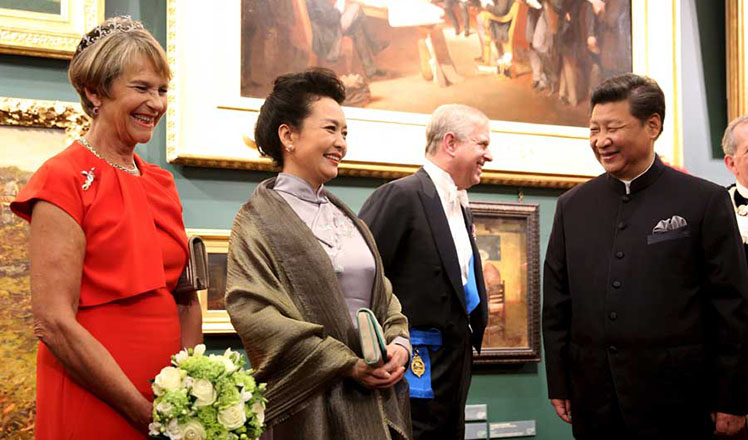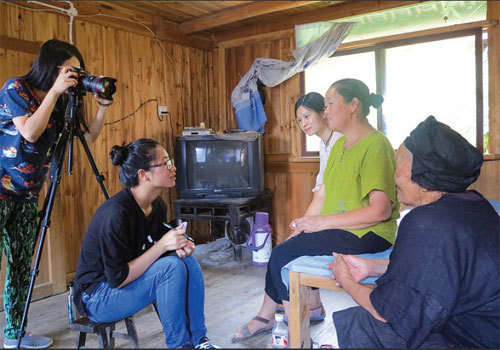Student films capture remote vanishing cultures
Updated: 2015-10-16 11:06
By Lia Zhu in San Francisco(China Daily USA)
|
||||||||
|
Students from San Francisco State University interview local villagers for their documentary project in Guizhou province, China, during the summer of 2015. Provided to China Daily |
The economic and social impacts on the aboriginal culture and lifestyles in China's less developed regions have not only raised concerns within the country, but also attracted the attention of some US college students who tried to capture their reflections on film.
This summer, a group of 11 students from the cinema department of San Francisco State University went on an adventure to remote mountain villages in China's Guizhou province, where minority groups have maintained their aboriginal lifestyle for thousands of years.
"It is indeed an adventure for them, as they have to overcome hardships and challenges like the language barrier," said Weimin Zhang, associate professor at San Francisco State, who initiated the International Documentary Film Summer Workshop in 2010.
For the last five years, the workshop was conducted in Shanghai. This was the first time the project was taken to a less-developed area, so the students could explore "the other side of China" by embracing the natural landscape and experiencing the unique culture and lifestyle of China's minority groups, Zhang said.
All of the villages in the region are facing a common challenge, that is how to preserve and pass down their traditional culture amidst the impact and pressures of economic and social development, she said.
"The students' films do not intend to provide an answer but rather an inspiration to raise people's awareness of the problem. That's what a documentary is meant to be," she said.
In collaboration with a local college, the students were divided into four teams and spent a month there conducting research and interviews, as well as shooting and editing footage. As a result, each team produced a short documentary.
The Basha Man tells how the village of Basha has changed since the advent of tourism. One Day in Danzhai features a woman of Miao nationality who inherited the unique wax painting skills passed through generations and lives a double life in a modern society and an ancient village. Ripple of a Stone tells of a few young adults' return to their dwindling hometown village in an attempt to save its 600 years of cultural heritage from dying. The Dreamweavers features another Miao woman who is preserve the ancient art of tin embroidery.
"People are people regardless of whether they grew up in a modern, progressive city or in a small village where they try to preserve a culture that is thousands of years old," said Andrew Wong, one of the filmmakers of Basha Man.
"We are all connected by our desires for a better life and, more importantly, we cannot think we know what is best for other people, just because we grew up differently than them," he said. "It is up to the individual to decide their own destiny. I hope that people realize that those who choose to live a traditional life are not any less than those choosing to live a modern one."
The film Basha Man also addresses the complexities that economic development has brought into these remote areas, as Gun Ni La, a local villager and folk dancing performer, expresses his mixed feelings about tourism - fear that their culture might be damaged on the one hand, and the profits that tourism has brought on the other.
Before tourism, Gun Ni La and his family would have some days when they didn't have enough to eat, but now they have leftovers after some meals, Wong said.
liazhu@chinadailyusa.com
- New rules separate CPC discipline from the law
- HIV-infected parcels found in Beijing's delivery system
- Upper level SSAT scores cancelled in China administration
- Authorities investigate mainland visitor's manslaughter in HK
- Top leadership expected to discuss high-level vacancies
- Nude photos of kindergarten kids cause outrage

 China and UK in the eyes of each other's painters
China and UK in the eyes of each other's painters
 President Xi, first lady Peng attend Guildhall banquet in London
President Xi, first lady Peng attend Guildhall banquet in London
 President Xi visits Imperial College London
President Xi visits Imperial College London
 Peng visits Fortismere School in London
Peng visits Fortismere School in London
 A tale of two countries – Chinese footballers' British struggles
A tale of two countries – Chinese footballers' British struggles
 Top 19 Chinese CEOs accompanying Xi to UK
Top 19 Chinese CEOs accompanying Xi to UK
 Royal toast: Queen hosts state banquet for visiting Xi
Royal toast: Queen hosts state banquet for visiting Xi
 Xi and first lady visit British royal collections' Chinese items
Xi and first lady visit British royal collections' Chinese items
Most Viewed
Editor's Picks

|

|

|

|

|

|
Today's Top News
Tu first Chinese to win Nobel Prize in Medicine
Huntsman says Sino-US relationship needs common goals
Xi pledges $2 billion to help developing countries
Young people from US look forward to Xi's state visit: Survey
US to accept more refugees than planned
Li calls on State-owned firms to tap more global markets
Apple's iOS App Store suffers first major attack
Japan enacts new security laws to overturn postwar pacifism
US Weekly

|

|









